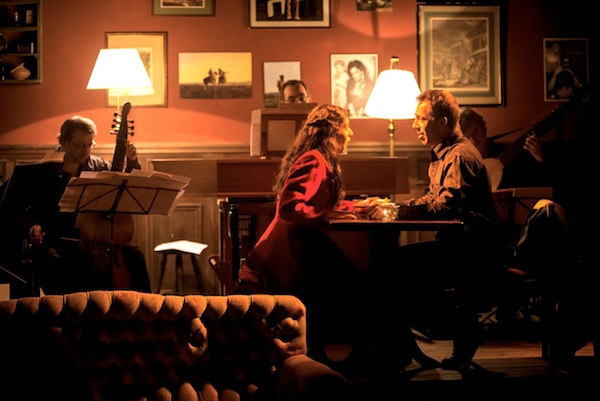
Laughing and weeping at an unusual “Baroque Early Music Cabaret”
By Sebastian Spreng, Visual Artist and Classical Music Writer
A spark happens when extremes touch, a spark that ignites the radiance of music that endures, a spark that arises spontaneously in Bromas y Lamentos (Jests and Laments), a gourmet production of superlative originality and exquisiteness in which past and present harmoniously converge. Part of the XXIX International Hispanic Theatre Festival of Miami, it is scheduled for July 18 and 19 and judging from its critical success in Buenos Aires, it promises to be a high point of the festival.
Photo by Alejandro Held
A collage of songs without borders of time or space, defying all categorization, Bromas y Lamentos is neither a concert of early music nor a staged recital nor a chamber opera nor a 21st century cabaret, but all of that and more. This Monteverdi Cabaret of sorts is a pastiche that combines a medieval lute with a Skype-transmitted aria, a tango and a guitar with a Baroque madrigal, and refined poetry within the entire vocal range, including the countertenor voice. It’s an equation that works thanks to an idea conceived and directed by outstanding regisseur Marcelo Lombardero, former director of Buenos Aires’ Teatro Colón and La Plata’s Teatro Argentino.
Bromas y Lamentos (scherzi and lamenti in the most literal sense of both Italian musical terms) takes us on a journey through the Renaissance and early opera from a modern perspective, the pieces linked by the most eternal of themes: love. According to Argentine musical critic Margarita Pollini: “The idea is as simple and logical as it is risky, and entails setting in the present an anthology of vocal pieces from the Italian Seicento. And it achieves the miracle of infusing, without altering either text or music, almost unheard-of freshness and closeness to a repertoire that has often been “sacralized,” thereby distorting its spirit.”
In the show, there is no lack of cell phone or TV set or tablet or computer for the unhappy Orpheus to communicate with Euridice, or Clorinda to confront Tancredi or Apollo to face the abandoned nymph. The singers told – or rather sang – their joys and sorrows to the audience while sitting beside them, as if confiding or even confessing. Scattered among the patrons, they defied all barriers and proved that the works of Claudio Monteverdi, Francesco Cavalli, Biagio Marini and Tarquinio Merula could well have been composed today, because theirs is living music, music that, even if written 400 years ago, speaks to our time.
The vastly experienced Lombardero says his approach is 100% contemporary, no matter how old the music. What is surprising is that the music of Bromas y Lamentos sounds more modern than much of what is being composed today. In Buenos Aires, critics heaped praise on the show’s creator and on singers Oriana Favaro, Cecilia Pastawski, Santiago Burgi and Mariano Fernández Bustinza, as well as on the musicians, all playing period instruments: Joelle Perdaens on the violin, Eugenia Montalto on the flutes, Pablo Angiletta on the viola da gamba and Miguel de Olaso on the lute and Baroque guitar, conducted by Jorge Lavista.
An attractive invitation for experts, aficionados and all those who allow themselves to be seduced by a freshness – as irreverent as it is welcome – that opens up the delights of early music. These pieces are ancient echoes that reverberate today because they share one essence and transmit the dizzying emotion generated by those who know what they are doing, and show it. Bromas y Lamentos promises to be the kind of performance you have to witness because it entails a unique experience.
BROMAS & LAMENTOS: (TEATRO MUSICAL CONTEMPORANEO in collaboration with FGO)
Friday and Saturday, July 18 and 19, 10 p.m. – $27.Miami-Dade County Auditorium (Lobby): 2901 W Flagler St, Miami; 305.547-5414; buy online
Recent Content
-
Artsarticle ·
-
Artsarticle ·
-
Artsarticle ·

